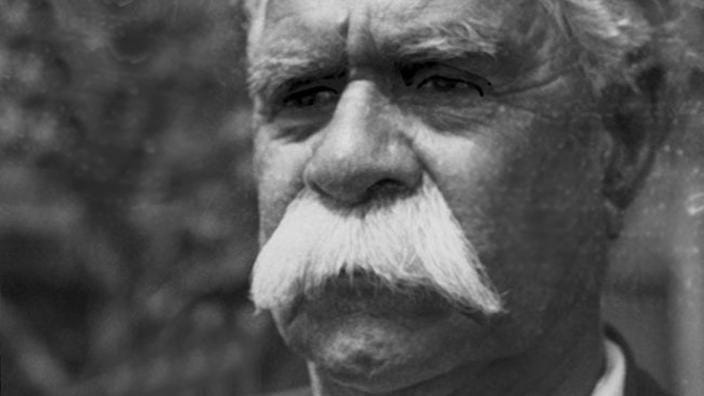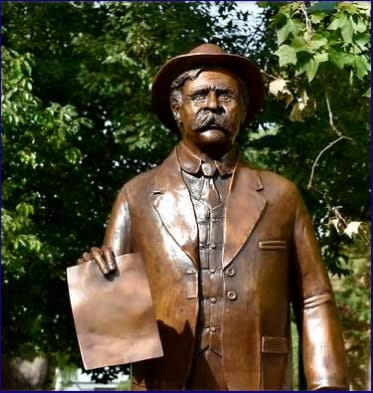
Indigenous activist William Cooper has inspired a new generation to make change in their communities by improving public health.
Born in 1861, Cooper pioneered the Aboriginal civil rights movement, and lobbied for the community well into his 70s.
A Yorta Yorta man, Cooper spent most of his life in Aboriginal missions and state-funded reserves until he was expelled from the Cummeragunja mission for protesting against discriminatory policies.
This formative experience led him to lobby for Aboriginal rights, joining the Australian Workers’ Union to represent Aboriginal workers and petitioning King George V for a member of parliament to represent Aboriginal rights.
In his 70s, Cooper moved to Melbourne and formed the Australian Aborigines’ League, Australia’s first entirely Aboriginal advocacy organisation. He held the first Aboriginal 'Day of Mourning’ on 26 January, 1938, which became the genesis of modern NAIDOC Week events.
Indigenous scholars John Singh-Nagyivan, 26, and Jaya Blandthorn, 19, are determined to continue William Cooper’s legacy of activism in their communities as the 2019 recipients of the William Cooper Indigenous Scholarship Fund.
'Advocacy is the only catalyst to make change'
John hopes to make change in the field of public health, and is studying a Bachelor of Science course.
He wants to use his voice to spur change in the community and improve social outcomes for disadvantaged Australians, as William Cooper did more than 80 years ago.
"Having a focus on public health, where advocacy is the only catalyst to make change, makes William Cooper's legacy really relevant in some of the work and study I'm doing," John said.
"Doing things like what William Cooper did back in 1937, they're the only things that change health inequalities.”
John first encountered the stark difference in social outcomes for Indigenous and non-Indigenous people when he became a ‘part-time dad’ as a teenager.
Growing up in Melbourne’s outer east, his young cousins were taken from his Aunty and placed with his mother. "When I was in high school, I had to look after my two cousins,” John said.

With new additions to the family, John had to step up as a primary carer for the two girls.
“I was kind of like a part-time dad when I was 14 or 15,” John said.
This experience opened his eyes to inequality and set him on a mission to improve health outcomes in his community.
While juggling his responsibilities as a carer and high school student, John transferred from Sherbrooke Community School to John Monash Science School in Year 10.
He's been involved in leadership initiatives including Youth Parliament and the National Aboriginal Torres Strait Islander Health Forum.
“People had to step up and try and make something of themselves to make change," John said.
He's volunteered and studied across Southeast Asia, including volunteering as a data analyst for the World Health Organisation in the Philippines, and studying public health at the National University of Singapore.
Before starting his degree course, John trained in circus arts and became an accomplished acrobat and fire-twirler.
He's also a third-generation cattle musterer, and recently returned after two years working the land in Far North Queensland.
John hopes to work for the World Health Organisation, building on his previous public health work for the New South Wales and Queensland governments.
'I want to promote the basic healthcare that they don't have'
Jaya Blandthorn dreams of working as a midwife in remote Indigenous communities to help mothers give birth on country.
Born on Wamba Wamba land, Jaya is studying a Bachelor of Nursing course, and shares a familial connection with William Cooper.
“For an Indigenous person, birthing on-country is your welcome,” Jaya said. “As soon as you're born, you have your smoking ceremony to welcome you to the land, and to everything.”
Jaya grew up in Swan Hill, in northwestern Victoria, and spent her childhood weekends fishing and hunting at her grandfather’s mission.
"My mission is actually out at Moonacullah – that's near Deniliquin," Jaya said. "We'd always go up for Easter, and I was always out in the mission on weekends.”
Eventually, Jaya hopes to transfer to midwifery and improve maternal health in Indigenous communities.
"I really want to try up north in Darwin and travel to really remote areas in Indigenous communities and work in health promotion,” Jaya said.
“I want to promote the basic healthcare that they don't have, and to provide to the elders and children.”
Jaya is active in sports, and has represented Victoria in Indigenous carnivals. Between studying and socialising, she enjoys playing netball and basketball.
In honour of William Cooper’s legacy, Monash University and Gandel Philanthropy have partnered to support the next generation of Indigenous ‘Agents of Change’ through the William Cooper Indigenous Scholarship Fund.





